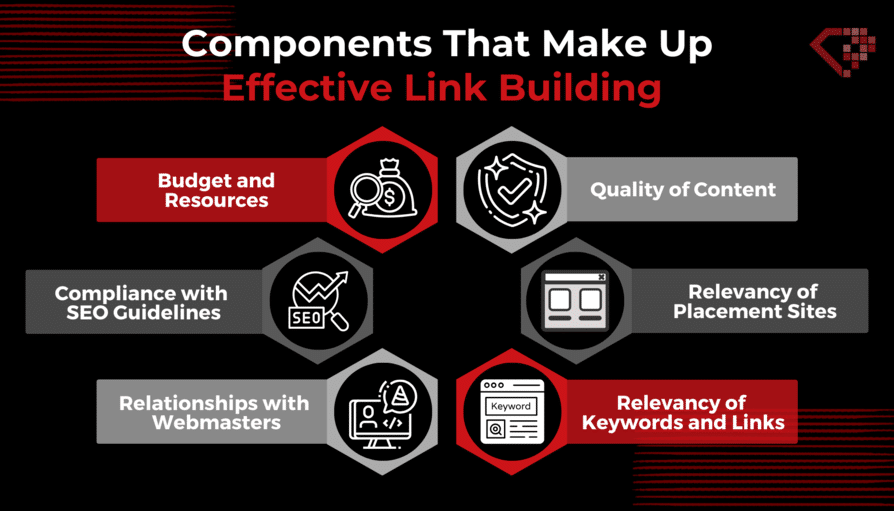When it comes to ranking well on Google, two things make a huge difference: content and backlinks. In fact, these are considered the top two factors for securing a spot with your target keywords, as HubSpot points out. It’s clear then, that having a robust link building strategy isn’t just helpful – it’s crucial.
The impact of link building goes even deeper. Studies, including one from uSERP, show that websites with a higher domain rating from authorities like Ahrefs, Moz, or SEMrush often find themselves on the first page of Google. This isn’t a coincidence. It’s a direct result of strong link building.
Here’s another interesting tidbit: the top-ranking page on Google typically has 3.8 times more backlinks than those ranked 2 to 10. This statistic underscores the power of a well-networked website. Diversity counts too. Websites linking back from a variety of unique root domains tend to rank higher, suggesting that the breadth of your link network is just as important as its size.
Why does all this matter for your business? Link building is a fundamental element of SEO. It’s about making your site not just visible, but authoritative and trustworthy. At Ruby Digital, crafting tailored link building strategies for our clients is one of our specialties. In this article, we’ll explore what link building is all about and how our team at Ruby Digital uses it to boost your brand’s online stature.
The Importance of Link Building in SEO
Link Building Definition:
At its core, link building involves acquiring hyperlinks from other websites to your own. But it’s much more than just collecting links, it’s about creating a strategic network that directs both users and search engines to your website. Think of each link as a bridge: the more bridges leading to your site, the easier it is for people (and search engines) to discover and visit your website.
Each hyperlink acts as a vote of confidence, a signal to search engines that other websites consider your content valuable and credible. This is crucial because search engines like Google use these ‘votes’ to gauge the trustworthiness and authority of your website. The more high-quality links you have pointing to your site, the stronger the signal of your site’s credibility.
In the world of SEO, this is fundamental. Search engines aim to provide users with the best possible results for their queries. Websites that are well-linked by others are seen as having higher authority and are therefore more likely to rank higher in search results. It’s important to clarify here that we’re not talking about any link from any site though – the quality of the linking site matters greatly. Links from reputable, well-established websites carry more weight and contribute more significantly to your site’s ranking potential.
For those less familiar with SEO, link building can be compared to getting recommendations or endorsements. Just as a personal recommendation from someone you trust carries weight, so does a link from a trusted website. It’s a sign that your site is a valuable resource, enhancing its visibility and accessibility.

Components That Make Up Effective Link Building:
- Quality of Content: Content must be high-quality, informative, and engaging to naturally attract backlinks.
- Relevancy of Placement Sites: Selecting websites that are relevant to your industry enhances the value of your backlinks.
- Relevancy of Keywords and Links: The links and keywords within your content should align with your business goals and improve your search engine rankings.
- Relationships with Webmasters: Good relationships with website owners and webmasters open doors for more link-building opportunities.
- Compliance with SEO Guidelines: Adhering to SEO best practices is crucial for your link-building efforts to be recognised as legitimate.
- Budget and Resources: Effective link building requires a strategic allocation of time, effort, and financial resources.

How to Build Links:
Here are some effective link building strategies:
- Content Creation: The foundation of good link building is creating high-quality, engaging content that people want to share. This can include informative blog posts, infographics, videos, or other forms of content that provide value to your audience. The goal is to produce content so compelling that other websites want to link to it naturally.
- Guest Blogging: Writing articles for other relevant websites in your industry is a powerful way to build links. By contributing valuable content to other sites, you can include links back to your own website. This not only drives traffic but also enhances your site’s credibility and authority. It’s important to choose guest blogging opportunities wisely, focusing on websites that are reputable and relevant to your niche.
- Broken Link Building: This strategy involves finding broken links on other websites and offering your content as a replacement. It starts with identifying web pages with links that no longer work (resulting in a 404 error, for example) and then reaching out to the website owner to suggest substituting the broken link with a link to relevant content on your site. This is beneficial for both parties: you get a new backlink, and the website owner improves their site’s user experience.
- Outreach: Directly reaching out to other website owners, bloggers, or webmasters is a proactive way to secure backlinks. This can be done by emailing or contacting them through social media, introducing your content and explaining why it would be valuable for their audience.
- Social Media Engagement: Promoting your content on social media can lead to natural backlinking. As your content is shared across social platforms, it increases the chances of it being seen and linked to by other website owners.
Each of these strategies is centered around the idea of adding value. The aim is not just to increase the number of backlinks but to build a network of quality, relevant links that enhance the user’s experience and, in turn, boost your website’s authority and ranking in search engines.
The Benefits of Link Building
The below illustrate the importance of link building in any SEO strategy:
- Improves Rankings: Strong backlink profiles are key to higher search engine rankings.
- Increases Website Traffic: High-quality backlinks from popular sites can boost traffic.
- Builds Website Authority: Authoritative backlinks enhance your site’s perceived credibility.
- Enhances Visibility and Exposure: Backlinks from well-known sites can increase your brand’s online presence.
- Long-Term Value and Trust: A network of quality backlinks adds sustainable value and builds trust.

Developing an effective link building strategy involves audience research, quality content creation, strategic outreach, and regular monitoring and analysis. Integrating these tactics into your overall SEO plan can significantly improve your online presence.
Ruby Digital’s Approach to Link Building
At Ruby Digital, we incorporate link building as a core element of our SEO strategies. We focus on enhancing website authority and keyword rankings through strategic link building. Our approach is comprehensive, considering link building as one of many essential components for boosting online performance.
The importance of link building in SEO goes far beyond just boosting rankings. It’s about establishing credibility, increasing visibility, and building a lasting online presence. Through the strategic use of content creation, broken link building, and outreach, we ensure that every link adds real value to both our clients and their audiences.
At Ruby Digital, we’re committed to harnessing the full potential of link building to create impactful, enduring results for our clients. Connect with us today and discover how our expert link building strategies can help your brand stand out as a trusted leader in your industry.


